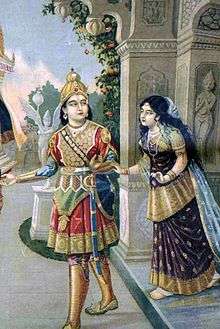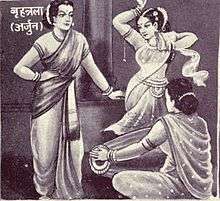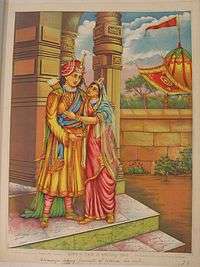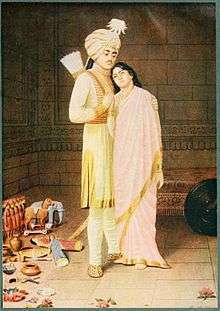Uttarā (Mahabharata)
In the Hindu epic Mahabharata, Uttarā or Anglicized as Uttaraa (उत्तरा) was the daughter of Queen Sudeshna and King Virata, at whose court the Pandavas spent a year in concealment during their exile. She was sister of Prince Uttara.[1]
| Uttaraa | |
|---|---|
| Mahabharata character | |
 Uttara with Abhimanyu | |
| In-universe information | |
| Family | Virata (Father), Sudeshna (Mother), Uttara (brother) |
| Spouse | Abhimanyu |
| Children | Parikshit |
Training under Brihannala

It is also believed that Uttaraa had learnt dance from Arjuna during the Pandavas' year of exile-in the Matsya Kingdom. Living incognito, as was the term of the banishment, Arjuna lived a life of a eunuch, named Brihannala and practised his art of dance learnt from the apsaras in heaven.[2]
Marriage with Abhimanyu

Once King Virata realized who Uttaraa's dance teacher was, he immediately proposed to offer his daughter to Arjuna However, Arjuna clarified to King Virata the doting relationship that a teacher has with his/her student is like that of a parent and child. He then proposed to make Uttaraa his daughter-in-law by marrying her to his son, Abhimanyu.[3][4]
Widowhood

Uttaraa was widowed at a very young age when Abhimanyu was killed in the Kurukshetra war. When Abhimanyu died, Uttaraa tried to burn herself on the pyre of Abhimanyu, but Krishna stopped her from doing so, informing her of her pregnancy.
Ashwatthama's attack
Towards the end of the Mahabharata war, with Uttaraa in labor, Ashwathama, son of Dronacharya, while trying to avenge the defeat of Duryodhana and the Kaurava army, engaged in a war with Arjuna. Knowing he could not beat Arjuna conventionally, Ashwatthama invoked the potent Brahmastra, despite the promise he had made to the father/teacher that he would never use such a weapon. When Arjuna fired a Brahmastra to match, Vyasa intervened, commanding both warriors to withdraw their weapons. While Arjuna successfully did so, Ashwatthama did not possess the required knowledge. Krishna suggested that Ashwatthama redirect the weapon to an uninhabited place. Regretful, tired, but still vengeful, Ashwatthama decided that if he could not end the Pandavas, he would end their lineage. He fired the weapon at Uttaraa's womb, attacking the fetus form of Parikshit. Krishna intervened and revived the stillborn baby, giving Parikshit his name. As a punishment Krishna curses Ashwatthama that he would lose his source of power, the jewel that adorned his shining forehead. This loss of the jewel that adorned his forehead made Ashwatthama lose his state of mental alertness and he was forced to retire to obscurity as a derelict in the forests. Parikshit became heir to the Kuru dynasty and eventually became king of Hastinapur. In due time, Parikshit gave Uttaraa a grandson, Janamejaya.
References
- Uttarahttps://archive.org/details/puranicencyclopa00maniuoft/page/817/mode/2up
- Gopal, Madan (1990). K.S. Gautam (ed.). India through the ages. Publication Division, Ministry of Information and Broadcasting, Government of India. p. 80.
- Mittal, J.P. (2006). History of ancient India : a new version. New Delhi: Atlantic. pp. 530–531. ISBN 9788126906161.
- Abhimanyu. Amar Chitra Katha Private Limited. ISBN 9788184821062.
